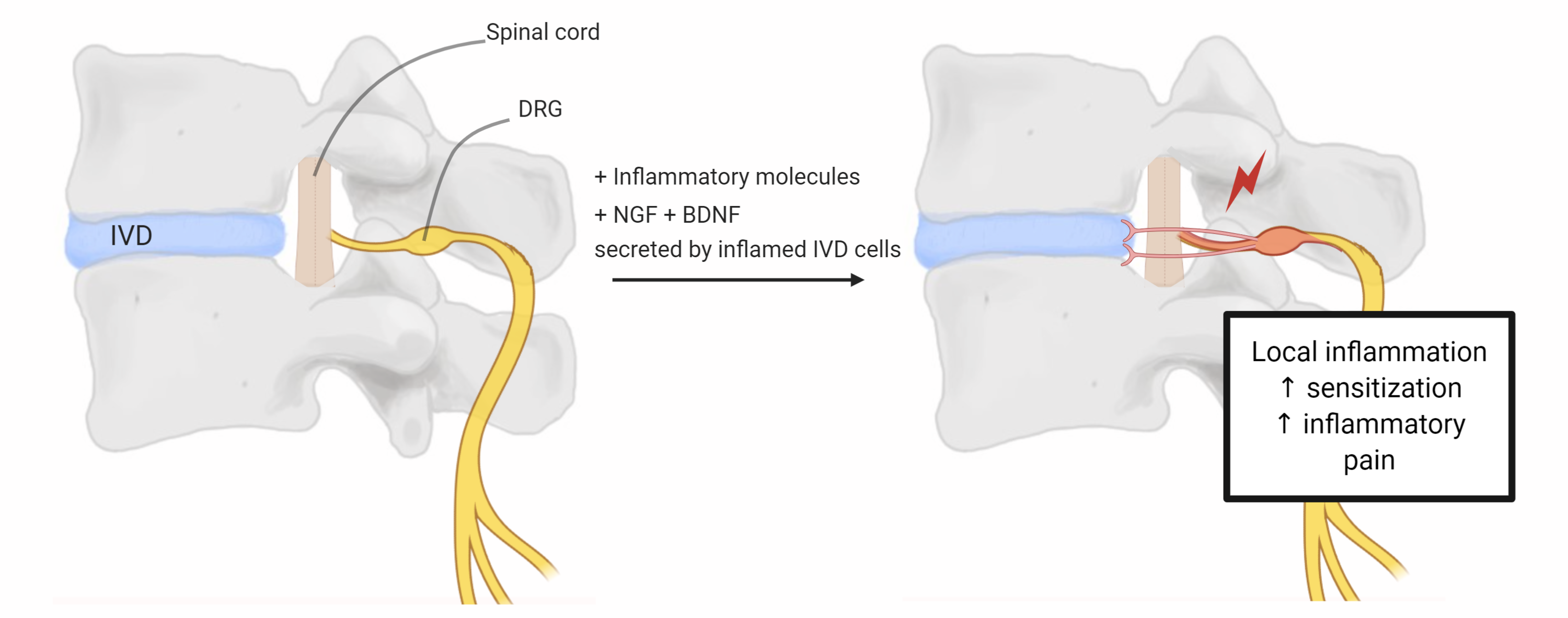Treating discogenic pain by reducing nerve sensitization and ingrowth using
Background
Up to 80% of all people will have low back pain (LBP) at least on time during their life. At least 20% of these people will move towards chronic disease. The causes of LBP are manifold with one of the main causes a degenerated intervertebral disc (IVD). An inflammatory environment is known to lead to degeneration of the IVD. While healthy IVDs are avascular and poorly innervated, increased neovascularization and innervation have been observed in degenerated discs. Nerve endings in the degenerated disc are activated due to a constant inflammation and they are thought to transmit the pain signals to the central nervous system. In pain-management of LBP, nonsteroidal anti-inflammatory drugs (NSAID) and specific cyclooxygenase-2 blocker, like celecoxib, are often prescribed for an oral use and have many side effects. The aim of this study is to investigate the interaction between celecoxib in an inflammatory disc environment and its effect on nerve cells. By using an in vitro model (with inflamed intervertebral disc cells), the effect of celecoxib on outgrowth and sensitization of dorsal root ganglion cells (DRG), which are the main transmitter of pain signals in the IVD, will be investigated. The proof of this specific effect will help to understand celecoxib´s mechanism of action in the inflamed disc environment and could promote its clinical translation.
-
Publication
Häne SI. Treating Discogenic Pain by Reducing Dorsal Root Ganglion Cell Sensitization using the COX-2 Inhibitor Celecoxib – An in vitro Study with Inflammatory Cytokine Treated Annulus Fibrosus Cells. 2020 ETH Zürich (S. Grad, U. Suter, Z. Li, J. Ma) – MSc ETH
Ma J, Häne S, Eglauf J, Pfannkuche J, Soubrier A, Li Z, Peroglio M, Hoppe S, Benneker L, Lang G, Wangler S, Alini M, Creemers LB, Grad S, Häckel S. Celecoxib alleviates nociceptor sensitization mediated by interleukin-1beta-primed annulus fibrosus cells. Eur Spine J. 2023;epub Apr 18. https://doi.org/10.1007/s00586-023-07672-x
-
Presentation
Häckel S, Häne S, Ma J, Li Z, Pfannkuche J, Peroglio M, Hoppe S, Benneker L, Lang G, Südkamp N, Grad S. Could the COX-2 inhibitor Celecoxib influence discogenic pain? An in vitro study with inflamed annulus fibrosus cells. 2020 EFORT virtual (poster)
Häckel S, Häne S, Eglauf J, Ma J, Li Z, Pfannkuche JJ, Peroglio M, Hoppe S, Benneker LM, Lang GM, Alini M, Grad S. Can the COX-2 inhibitor Celecoxib influence discogenic pain signals? An in vitro study with inflamed annulus fibrosus cells. 2021 ORS virtual (oral)
Häckel S, Häne S, Eglauf J, Ma J, Li Z, Pfannkuche JJ, Peroglio M, Hoppe S, Benneker LM, Lang GM, Alini M, Grad S. Can the COX-2 inhibitor Celecoxib influence discogenic pain signals? An in vitro study with inflamed annulus fibrosus cells. 2021 ISSLS virtual (poster)
Häckel S, Häne S, Eglauf J, Ma J, Pfannkuche J, Hoppe S, Albers C, Grad S. Die modulierende Wirkung des Cyclooxygenase-2 Inhibitors Celecoxib auf diskogenen Schmerz - eine in vitro Studie mit humanen Annulus fibrosus Zellen. 2021 DKOU (oral)
Häckel S, Ma J, Häne S, Eglauf J, Soubrier A, Peroglio M, Li Z, Hoppe S, Benneker L, Wangler S, Alini M, Grad S. An in vitro large animal model to investigate the effect of celecoxib on discogenic pain-associated sensory neuronal sensitization. 2022 Global Spine Congress (oral)
-
Partner
Sonja Häckel, Inselspital Bern, Switzerland
Lorin Benneker, Inselspital Bern, Switzerland
Sven Hoppe, Inselspital Bern, Switzerland


